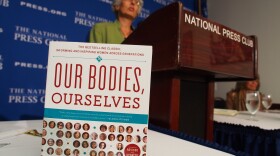
Neda Ulaby
Neda Ulaby reports on arts, entertainment, and cultural trends for NPR's Arts Desk.
Scouring the various and often overlapping worlds of art, music, television, film, new media and literature, Ulaby's stories reflect political and economic realities, cultural issues, obsessions and transitions.
A twenty-year veteran of NPR, Ulaby started as a temporary production assistant on the cultural desk, opening mail, booking interviews and cutting tape with razor blades. Over the years, she's also worked as a producer and editor and won a Gracie award from the Alliance for Women in Media Foundation for hosting a podcast of NPR's best arts stories.
Ulaby also hosted the Emmy-award winning public television series Arab American Stories in 2012 and earned a 2019 Knight-Wallace Fellowship at the University of Michigan. She's also been chosen for fellowships at the Getty Arts Journalism Program at USC Annenberg and the Knight Center for Specialized Journalism.
Before coming to NPR, Ulaby worked as managing editor of Chicago's Windy City Times and co-hosted a local radio program, What's Coming Out at the Movies. A former doctoral student in English literature, Ulaby has contributed to academic journals and taught classes in the humanities at the University of Chicago, Northeastern Illinois University and at high schools serving at-risk students.
Ulaby worked as an intern for the features desk of the Topeka Capital-Journal after graduating from Bryn Mawr College. But her first appearance in print was when she was only four days old. She was pictured on the front page of the New York Times, as a refugee, when she and her parents were evacuated from Amman, Jordan, during the conflict known as Black September.
-
Clarence Fountain was one of the last surviving founding members of The Blind Boys of Alabama. They first met as pre-teens at the Alabama Institute for the Negro Blind in the early 1940s. Fountain died Sunday of complications from diabetes at 88.
-
Harvey Weinstein turned himself into the New York Police Department Friday after spending months attempting to deflect multiple investigations into sexual abuse. But how does this surrender mark real change, legally and culturally?
-
The Smithsonian's National Portrait Gallery in Washington, D.C., has unveiled a portrait of Lacks, whose cells have been used for decades — without her consent — to find medical breakthroughs.
-
Trenton Doyle Hancock wasn't allowed to have certain toys as a child. Now he collects them. His new exhibition uses dolls of different skin colors to reflect on race in America.
-
Food from the frozen aisle accounts for only about 6 percent of grocery store sales — and that percentage has seen some declines over the past few years. The deli section, however, keeps expanding.
-
An exhibit at the National Building Museum has been adapted from Matthew Desmond's 2017 Pulitzer-Prize-winning book Eviction: Poverty and Profit in the American City into an "immersive" experience.
-
Kasell brought unflappable authority to the news, but he also had a lively sense of humor, revealed late in his career when he became the judge and scorekeeper for Wait Wait... Don't Tell Me!
-
The 2018 Pulitzer Prizes were announced Monday. Kendrick Lamar joined the staffs of The New York Timesand The Washington Postalong with the rest of this year's winners.
-
 Feminist Health Guide 'Our Bodies, Ourselves' Will Stop PublishingThe groundbreaking book was first released in the early 1970s. It gave women frank information about then-taboo topics like masturbation, birth control and female sexual anatomy.
Feminist Health Guide 'Our Bodies, Ourselves' Will Stop PublishingThe groundbreaking book was first released in the early 1970s. It gave women frank information about then-taboo topics like masturbation, birth control and female sexual anatomy. -
The Indian architect has been awarded the Pritzker Architecture Prize, known as the Nobel for architects. His buildings reflect an investment in local materials, social change and the environment.





